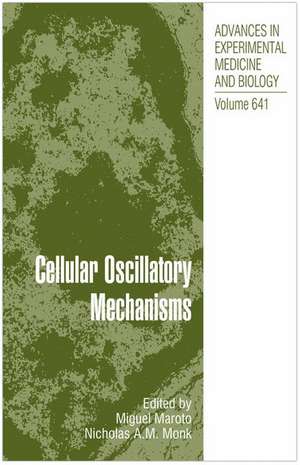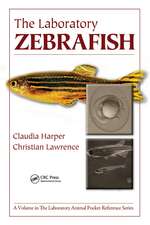Cellular Oscillatory Mechanisms: Advances in Experimental Medicine and Biology, cartea 641
Editat de Miguel Maroto, Nick Monken Limba Engleză Hardback – 14 aug 2008
| Toate formatele și edițiile | Preț | Express |
|---|---|---|
| Paperback (1) | 968.67 lei 38-44 zile | |
| Springer – 29 noi 2010 | 968.67 lei 38-44 zile | |
| Hardback (1) | 981.70 lei 38-44 zile | |
| Springer – 14 aug 2008 | 981.70 lei 38-44 zile |
Din seria Advances in Experimental Medicine and Biology
- 9%
 Preț: 719.56 lei
Preț: 719.56 lei - 5%
 Preț: 717.00 lei
Preț: 717.00 lei - 5%
 Preț: 717.00 lei
Preț: 717.00 lei - 15%
 Preț: 640.24 lei
Preț: 640.24 lei - 5%
 Preț: 715.71 lei
Preț: 715.71 lei - 5%
 Preț: 716.28 lei
Preț: 716.28 lei - 20%
 Preț: 691.93 lei
Preț: 691.93 lei - 5%
 Preț: 1031.00 lei
Preț: 1031.00 lei - 5%
 Preț: 820.42 lei
Preț: 820.42 lei - 5%
 Preț: 716.28 lei
Preț: 716.28 lei - 15%
 Preț: 641.38 lei
Preț: 641.38 lei - 5%
 Preț: 717.20 lei
Preț: 717.20 lei - 5%
 Preț: 715.35 lei
Preț: 715.35 lei - 5%
 Preț: 1113.83 lei
Preț: 1113.83 lei - 20%
 Preț: 1161.71 lei
Preț: 1161.71 lei - 5%
 Preț: 1170.51 lei
Preț: 1170.51 lei - 18%
 Preț: 1119.87 lei
Preț: 1119.87 lei - 5%
 Preț: 1288.48 lei
Preț: 1288.48 lei - 5%
 Preț: 1164.67 lei
Preț: 1164.67 lei - 5%
 Preț: 1101.73 lei
Preț: 1101.73 lei - 18%
 Preț: 1123.67 lei
Preț: 1123.67 lei - 5%
 Preț: 1435.64 lei
Preț: 1435.64 lei - 20%
 Preț: 1044.10 lei
Preț: 1044.10 lei - 18%
 Preț: 946.39 lei
Preț: 946.39 lei - 5%
 Preț: 292.57 lei
Preț: 292.57 lei - 18%
 Preț: 957.62 lei
Preț: 957.62 lei - 18%
 Preț: 1235.76 lei
Preț: 1235.76 lei - 5%
 Preț: 1231.55 lei
Preț: 1231.55 lei - 5%
 Preț: 1292.30 lei
Preț: 1292.30 lei - 5%
 Preț: 1102.10 lei
Preț: 1102.10 lei - 18%
 Preț: 1132.81 lei
Preț: 1132.81 lei - 5%
 Preț: 1165.19 lei
Preț: 1165.19 lei - 5%
 Preț: 1418.48 lei
Preț: 1418.48 lei - 5%
 Preț: 1305.63 lei
Preț: 1305.63 lei - 18%
 Preț: 1417.72 lei
Preț: 1417.72 lei - 18%
 Preț: 1412.99 lei
Preț: 1412.99 lei - 24%
 Preț: 806.15 lei
Preț: 806.15 lei - 18%
 Preț: 1243.29 lei
Preț: 1243.29 lei - 5%
 Preț: 1429.44 lei
Preț: 1429.44 lei - 5%
 Preț: 1618.70 lei
Preț: 1618.70 lei - 5%
 Preț: 1305.12 lei
Preț: 1305.12 lei - 18%
 Preț: 1124.92 lei
Preț: 1124.92 lei - 5%
 Preț: 1097.54 lei
Preț: 1097.54 lei - 15%
 Preț: 649.87 lei
Preț: 649.87 lei - 5%
 Preț: 1097.54 lei
Preț: 1097.54 lei - 18%
 Preț: 945.79 lei
Preț: 945.79 lei - 5%
 Preț: 1123.13 lei
Preț: 1123.13 lei - 20%
 Preț: 816.43 lei
Preț: 816.43 lei
Preț: 981.70 lei
Preț vechi: 1033.37 lei
-5% Nou
Puncte Express: 1473
Preț estimativ în valută:
187.85€ • 196.63$ • 156.35£
187.85€ • 196.63$ • 156.35£
Carte tipărită la comandă
Livrare economică 27 martie-02 aprilie
Preluare comenzi: 021 569.72.76
Specificații
ISBN-13: 9780387097930
ISBN-10: 0387097937
Pagini: 153
Ilustrații: VIII, 153 p. 67 illus., 2 illus. in color.
Dimensiuni: 155 x 235 x 15 mm
Greutate: 0.43 kg
Ediția:2009
Editura: Springer
Colecția Springer
Seria Advances in Experimental Medicine and Biology
Locul publicării:New York, NY, United States
ISBN-10: 0387097937
Pagini: 153
Ilustrații: VIII, 153 p. 67 illus., 2 illus. in color.
Dimensiuni: 155 x 235 x 15 mm
Greutate: 0.43 kg
Ediția:2009
Editura: Springer
Colecția Springer
Seria Advances in Experimental Medicine and Biology
Locul publicării:New York, NY, United States
Public țintă
ResearchCuprins
Calcium Oscillations.- Oscillations by the p53-Mdm2 Feedback Loop.- cAMP Oscillations during Aggregation of Dictyostelium.- Min Oscillation in Bacteria.- Development on Time.- Oscillatory Expression of Hes Family Transcription Factors: Insights from Mathematical Modelling.- Reverse Engineering Models of Cell Cycle Regulation.- Mitochondrial Oscillations in Physiology and Pathophysiology.- Respiratory Oscillations in Yeasts.- Stochastic Phase Oscillator Models for Circadian Clocks.
Notă biografică
MIGUEL MAROTO, PhD, is a MRC Career Development Fellow and Lecturer at the University of Dundee, UK. He received his PhD in Biochemistry and Molecular Biology from the Department of Biochemistry of the Universidad Autonoma of Madrid, Spain. His research interests include investigating the biochemical basis of different signalling mechanisms implicated in the acquisition of specific cell fates during vertebrate development. During the last years he has been implicated in the analysis of the mechanism of the molecular clock involved in the control of the process of somitogenesis.
NICK MONK, PhD, is an Associate Professor and Reader in Applied Mathematics at the University of Nottingham, UK. Having received his Ph.D. in theoretical physics from the University of London, his research changed focus to centre on the mathematical and computational modelling of biological systems. Particular areas of interest include pattern formation, developmental biology, complex network dynamics and mechanisms of intercellular signalling.
NICK MONK, PhD, is an Associate Professor and Reader in Applied Mathematics at the University of Nottingham, UK. Having received his Ph.D. in theoretical physics from the University of London, his research changed focus to centre on the mathematical and computational modelling of biological systems. Particular areas of interest include pattern formation, developmental biology, complex network dynamics and mechanisms of intercellular signalling.








